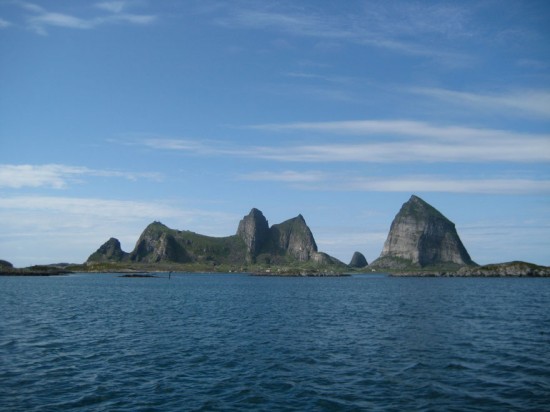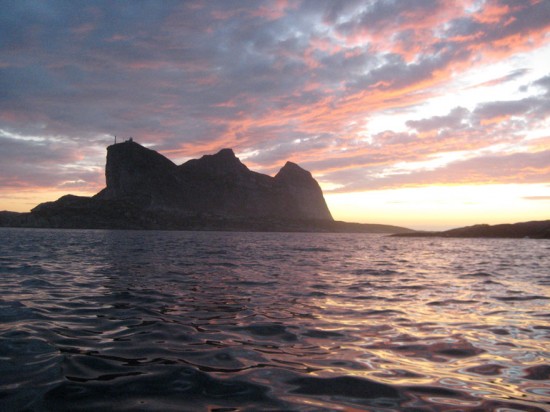
by Luke Turner
For most of the year, the flat grey cliffs, steep-sided inlets, rocky drowned valleys, and rolling slopes (richly carpeted with moss and wild flowers) of the Traena archipelago are home to just 400 people. Some work in the tourist industry, looking after guests in chalets painted red in the Scandinavian fashion. The lettering on the notices in the fish processing plant suggests others are seasonal Polish workers, who’ve made it to this point just south of the Arctic Circle to toil on the vicious looking fish-gutting machines emblazoned with gruesome diagrams of severed fingers, filling giant white plastic boxes with the produce of the cold waters.
For one weekend, though, the forklift used to shift the fruits of the sea is employed to drive boxes of ice from the fishing plant around the island to the Traena Festival. This small grassy field is filled by 2000 Norwegians in unfettered escape from Northern life, drunken and crazed on beer, munching on whale burgers from the one catering stall on site. There are two bars on this Island, one right on the water edge run by an impossibly attractive woman who, in self-conscious furs and reindeer earrings, seems to be an escapee from the Oslo fashion set. The other, up by the Festival, is a characterless collection of rooms but is owned by a genial man who sells his beer for a mere five Krona a can, and promises that in 25 years, he hasn’t indulged in any “monkey business” to exploit in-comers. You imagine neither does a roaring trade.
Although work and the Festival is why I’m here – to cover British Sea Power playing their Man of Aran soundtrack in a tiny, white-painted stave church for the NME – it’s hard not to simply to be overwhelmed by this magical place. In Man of Aran, British Sea Power have perhaps found the most perfect realisation of their aesthetic and desire to harness the medium of amplified rock music to the exploration of subjects less travelled. That’s not to say that their other material is in any way diminished by the comparison, far from it – it’s just that in the largely instrumental, lively score they seem to have tapped into something that the original print of the film, with its inappropriate big band accompaniment, was lacking.
When British Sea Power took Man Of Aran to the Branchage Film Festival in Jersey last year, it moved many on that island community. This time, it has even more of an impact: at the end of each screening, applause and cheers fill the tiny church, and it’s not just the locals who have eyes filled with tears. In part, seeing Man of Aran in Traena church is so moving because outside the church you’re surrounded by a landscape, and a people, only slightly removed from those doughty Islanders Robert Flaherty filmed in 1934. Technology might have moved on, and the boats are bigger – but there’s still a smashed life vessel beached on a dock and, between two of the peaks on the island of Sanna, seaweed-covered boulders lie far above this summer high water mark, a reminder that this cobalt sea has darker moods.

The rest of the four days and nights (although these are never nights, for the sun doesn’t ever fully set) are spent in a strange and magical reverie, motoring around the islands on small boats, British Sea Power’s avid birdwatcher Martin Noble adding three new species (bluethroat, sea eagle, northern wheatear) to his notebook. The islanders are hospitable, too, wanting to share their day-to-day lives with those of us from near and far away. On one morning, a blue fishing boat pulls into the little harbour where we’re staying, and a motley collection of Brits and Norwegian clamber aboard.
We head out past the shelter of the smaller islands into the Arctic Ocean, throwing handlines over the side whenever our captain Thor spots a shoal on his sonar. Soon, pollack, cod and haddock are coming over the side. Thor reaches into the box, and slits a cod under the gills. Rummaging around in the red oomska, he pulls out the heart and announces something in Norwegian – he doesn’t speak English. A local onboard tells us that he was explaining the raw heart is considered a delicacy by some, but nobody onboard seems keen to sample this treat, and it sits in the box, gently pulsing, for the next hour. Back on land, we clean and fillet the fish, wrap the meat in foil, and cook them over hot coals. It’s the best I’ve ever tasted.
At the Festival site on the last night, we see Thor sat on a picnic bench, still in the bright red jacket he wore to sea. He greets NME photographer Dan and I with hearty shakes of the hand and enthusiastic words of Norwegian. Dan buys him a beer and shows the pictures he took on the boat. With gesticulations and translation from a Norwegian so drunk he can hardly speak, we get the captain’s address. Not email, just the following: Thor Jeppesen, 8742 Traena, Norge.